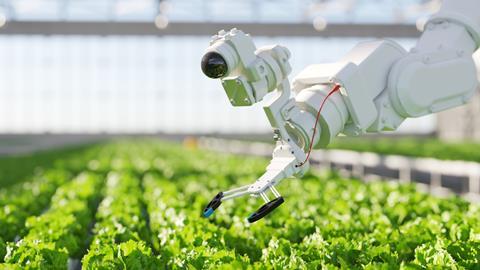
Our farmers have been the backbone of the food production system for millennia, and in 2023 they are forward-looking and keen to innovate. It is our job to support them to drive a resilient and productive agriculture sector that puts food on our tables today, while also paving the way toward sustainable food production for future generations.
Key to this is building a spirit of collaboration and innovation. This year alone, the UK is investing £168m in research and development grants. This investment is part of Defra’s wider £270m Farming Innovation Programme (FIP), which has seen the development of a wide array of new approaches to help farms be more sustainable and productive, from new ways to reduce or eliminate pesticide use through to projects to reduce emissions from livestock.
The goal is not only to make our farmers more efficient but also to equip them with the knowledge and tools to beat the challenges they are facing. Resilient crops, reduced water pollution, and sustainable farming practices are becoming the norm, thanks to the strides we are making in UK agricultural technology. For example, the Precision Breeding Act became law this year and unlocks the potential for precision breeding technologies, such as gene editing to deliver drought and disease-resistant crops, disease resistance in animals, and reductions in agrochemical use. For consumers, this also has the potential to deliver health benefits more easily and cheaply and to help tackle allergens such as gluten.
But if we’re to build a truly cutting-edge food sector, we need to learn from what others are doing around the world. I had the privilege of touring the Iowa State University Research Park, a hub of pioneering agricultural research. I saw how students were gaining practical experience in a cornmill and being sponsored by businesses eager to cultivate the next generation of agricultural leaders. It is clear the future of farming is not only in the hands of those with traditional agricultural degrees, but also in the minds of young engineers, innovators and entrepreneurs.
The message to our youth is clear: the agricultural sector is evolving and there has never been a more exciting time to be part of it. During my roundtable discussion at the Iowa State University, I emphasised the need for young people to have the opportunity to experiment, make mistakes, and innovate. We must encourage a wide range of talents – from agricultural sciences to engineering – to come together in the farming sector and add fresh perspectives and direction.
The UK and the US, two agricultural powerhouses, are committed to sharing ideas and research to drive innovation – not only at home but around the world. Just last year, British lamb was exported to the US for the first time in over 20 years, opening a market of over 300 million consumers to high-quality British lamb. I’m proud of our agri-food attachés who are working hard to explore new trade opportunities like this and fly the flag for UK farmers. Being at events such as the Global World Food Prize in Iowa has made clear the importance of such collaborations, providing a platform to discuss how we can work together to reward our farmers back home.
The government stands firmly behind farming and food innovation, research and development as the cornerstones of modern farming practices. By providing opportunities, funding and a supportive ecosystem within the sector, we aim to empower our farmers, drive innovation and create a sustainable and prosperous future for agriculture across the UK.
